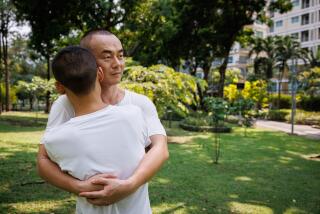‘An important step’ for gay rights in China
Reporting from Beijing — Before she became enmeshed in a potentially groundbreaking lawsuit against the Chinese government, Chen Qiuyan was an ordinary college student struggling to come to terms with her sexuality.
Early this year, the 20-year-old college junior was beginning to realize that she was a lesbian — her male classmates at Sun Yat-sen University in Guangzhou didn’t interest her, but a female classmate did — and she sought guidance in the school library.
Many of the textbooks she pulled from the shelves described homosexuality as an illness. Some even recommended electroshock therapy as a “cure.” She sent a letter to provincial education officials seeking an explanation. By law, they were required to reply within 15 days. When they didn’t, she decided to sue.
To her surprise, a Beijing court approved the lawsuit, and on Tuesday, Chen — who also goes by the pseudonym Qiu Bai — came face to face with Ministry of Education officials in court to make her case.
“I’m a bit happy because I’ve waited so long to have a proper dialogue with the Ministry of Education, and today we got to discuss these issues in person,” Chen said over lunch near the Beijing courthouse. “I think that’s an important step. But I’m a bit disappointed, because when we finally saw each other, there were many issues I asked them to resolve, and yet they gave me very unclear answers.”
Although social mores in China have relaxed considerably in recent decades — the country stopped classifying homosexuality as a psychological disorder in 2001 — many Chinese families, employers and schools still consider homosexuality taboo.
Chinese authorities do not recognize same-sex marriages or civil unions. A decades-long one-child policy (changed to a two-child policy last month) has created a culture in which parents put extraordinary pressure on their children to marry and have children of their own.
The court’s decision to hear Chen’s case represents a “modest” step forward for gay rights in China amid an increasingly hostile environment for grass-roots activism, according to Maya Wang, a Hong Kong-based researcher at Human Rights Watch.
“The reason I say modest is that Chinese courts are supposed to allow citizens to lodge complaints,” she said. “But in reality, a lot of political cases are not even heard — if you want to sue the police, for example, the court simply won’t hear the case.”
In recent years, Chinese authorities have detained scores of activists, lawyers and dissidents for challenging state authority, tightening the country’s already-limited space for rights advocacy. In March, police detained five feminist activists for more than a month over plans to distribute anti-harassment stickers near bus and subway stations. In July, hundreds of Chinese activists and rights lawyers were detained or interrogated in a nationwide crackdown that analysts described as the most severe in recent memory.
Yet Chen’s case, Wang noted, counts among several recent legal victories by gay rights activists. In 2014, a gay man successfully sued a clinic for offering “gay-straight conversion therapy” on the grounds of false advertising; in September, a gay rights activist and filmmaker filed a lawsuit against China’s media watchdog, the State Administration of Press, Publication, Radio, Film and Television, for censoring one of his films.
“Chinese law does prohibit discrimination, but it doesn’t give a precise definition of what that means,” Wang said. “So [Chen] is suing the Ministry of Education on a technical point — on administrative procedures — but not on the greater point of discrimination against [lesbian, gay, bisexual and transgender] people.”
NEWSLETTER: Get the day’s top headlines from Times Editor Davan Maharaj >>
Several calls to the Ministry of Education on Tuesday afternoon were unanswered.
Chen says that although the government has not pressured her to drop the case, her activism has strained her family life. Soon after she filed the lawsuit, an anxious university guidance counselor called her parents and told them about the case, disclosing her sexuality without her consent.
“They were totally caught off-guard,” Chen said. “They were very sad and depressed. They even took me to see doctors and then test my hormones and my psychological state.”
Yet Chen remains hopeful. During her lunch she received a text from her lawyer, Wang Zhenyu, congratulating her on the hearing. “I think the biggest success of this case is that the Ministry of Education representatives said they’ve seen media reports [about the case], and they’ve studied this issue,” he wrote. “Paying attention is the first step to change. Your action caused the Ministry of Education to pay attention. This is a great achievement.”
Nicole Liu in The Times’ Beijing bureau contributed to this report.
ALSO
China prepares to rank its citizens on ‘social credit’
Syria war pulls Russia and Turkey into a risky confrontation
Pentagon inquiry finds human, technical errors led to Kunduz hospital airstrike
More to Read
Sign up for Essential California
The most important California stories and recommendations in your inbox every morning.
You may occasionally receive promotional content from the Los Angeles Times.










